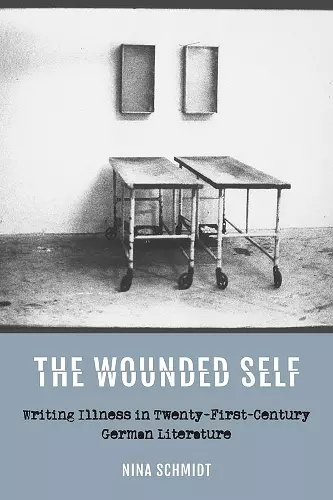The Wounded Self
Writing Illness in Twenty-First-Century German Literature
Format:Hardback
Publisher:Boydell & Brewer Ltd
Published:29th Jun '18
Currently unavailable, and unfortunately no date known when it will be back

Takes the recent wave of German autobiographical writing on illness and disability seriously as literature, demonstrating the value of a literary disability studies approach. In the German-speaking world there has been a new wave - intensifying since 2007 - of autobiographically inspired writing on illness and disability, death and dying. Nina Schmidt's book takes this writing seriously as literature,examining how the authors of such personal narratives come to write of their experiences between the poles of cliché and exceptionality. Identifying shortcomings in the approaches taken thus far to such texts, she makes suggestions as to how to better read their narratives from the stance of literary scholarship, then demonstrates the value of a literary disability studies approach to such writing with close readings of Charlotte Roche's Schoßgebete(2011), Kathrin Schmidt's Du stirbst nicht (2009), Verena Stefan's Fremdschläfer (2007), and - in the final, comparative chapter - Christoph Schlingensief's So schön wie hier kanns im Himmel gar nicht sein! Tagebuch einer Krebserkrankung (2009) and Wolfgang Herrndorf's blog-cum-book Arbeit und Struktur (2010-13). Schmidt shows that authors dealing with illness and disability do so with an awareness of their precarious subject position in the public eye, a position they negotiate creatively. Writing the liminal experience of serious illness along the borders of genre, moving between fictional and autobiographical modes, they carve out spaces from which they speak up and share their personal stories in the realm of literature, to political ends. Nina Schmidt is a postdoctoral researcher in the Friedrich Schlegel Graduate School of Literary Studies at the Freie Universität Berlin.
The author shows how the texts under discussion break down borders in the literary and societal realms by way of their deep and multifaceted analyses...The way she proceeds does justice to texts that met a negative reception, offers a basis for the interpretation of future texts, and could represent an enrichment of German Studies. -- Malcolm Pender * GERMANISTIK *
[B]reaks new ground . . . . Schmidt . . . ask[s] why so little scholarly attention has been paid to autobiographical writing about the universal experience of illness. [Her] impeccable scholarship explains why we haven't analyzed illness narratives more deeply, convinces us why we should, and shows us how we can. -- Elizabeth Hamilton * GEGENWARTSLITERATUR *
Schmidt's exceptionally rich book makes a strong case for the need not only to include but better integrate the field of disability studies [and German Studies] . . . . [C]ontributes meaningfully to how we read and understand innovative narrative strategies, structures, and experiences of illness and disability . . . . [I]ts critical perspective would also be of great value to those interested in the fields of literature, narratology, and narrative medicine. * STUDIES IN 20TH- and 21ST-CENTURY LITERATURE *
Nina Schmidt's study of illness writing in contemporary German-language literature not only fills notable gaps in scholarship on the primary texts she analyzes, but also knits together a wide range of scholarship on autofiction, disability studies, and (not only German) illness writing into an engaging study of great importance. -- Alexandra M. Hill * GERMAN STUDIES REVIEW *
Taken as a whole, The Wounded Self is an excellent scholarly book that should significantly influence future debates on the topics of autobiography, autofiction, disability studies, and illness writing. In addition to German studies and cultural studies, it will be of great interest to the medical humanities. -- Ina Linge * WEIMARER BEITRÄGE *
[C]omprehensive and excellently argued . . . . With its demanding objectives and carefully developed theoretical framework, The Wounded Self presents innovative and insightful readings of diverse twenty-first century illness narratives. This exemplary study is a valuable contribution to the field of illness narratives and to the ongoing complex theorization of autobiographical authorship that deals with illness. -- Franziska Gygax * BIOGRAPHY *
ISBN: 9781640140165
Dimensions: unknown
Weight: 518g
246 pages